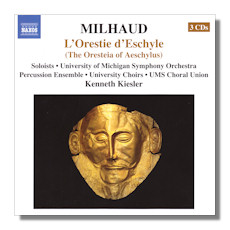
The Internet's Premier Classical Music Source
Related Links
- Milhaud Reviews
- Latest Reviews
- More Reviews
-
By Composer
-
Collections
DVD & Blu-ray
Books
Concert Reviews
Articles/Interviews
Software
Audio
Search Amazon
Recommended Links
Site News
 CD Review
CD Review
Darius Milhaud

The Oresteia of Aeschylus
(L'Orestie d'Eschyle)
L'Agamemnon
Les Choéphores
Les Eumenénides
- Dan Kempson, baritone (Orestes)
- Lori Phillips, soprano (Clytemnestra)
- Julianna Di Giacomo, soprano (Pythia)
- Brenda Rae, soprano (Athena, A Slave Woman)
- Kristin Eder, mezzo-soprano (Electra)
- Tamara Mumford, mezzo-soprano (Athena)
- Jennifer Lane, contralto (Athena)
- Sidney Outlaw, baritone (Apollo)
- Sophie Delphis, speaker (Leader of the Slave Women)
Choirs of the University Musical Society
University of Michigan Percussion Ensemble
University of Michigan Symphony Orchestra/Kenneth Kiesler
North American Premiere, recorded live
Ann Arbor, Michigan, Hill Auditorium, 4 April 2013
Naxos Opera 8.660349-51 3CDs 2:21:24
This performance – the first in North America and reportedly the first anywhere since around 1963 – celebrated 100 years of music at Hill Auditorium in Ann Arbor, Michigan. Great American composer William Bolcom was instrumental in bringing this strange and mythological epic to the stage, and Naxos was wise enough to record the entire production. As a disclaimer, I was in the audience, and wrote enthusiastically about my experience for Classical Net. As a second disclaimer, my parents met at Michigan State. Oh right, the music.
As I penned previously, the story itself is somewhat difficult to follow. To summarize, Agamemnon is murdered by his wife at the conclusion of the Trojan War. She is then killed by her own son, Orestes, to avenge the father's death. The God Apollo supports this choice (something about honor), but this doesn't stop the sprit of the mother from enlisting the dreadful Furies to torment him for eternity. Orestes then calls on both Apollo and the even mightier Pallas Athena to intercede on his behalf. The Furies and Apollo present testimony for the people of Athens in a surprisingly tense courtroom drama. Unable to decide, the people give Athena the final vote, and she rules in Orestes' favor. Enraged, the Furies threaten the destruction of Athens, but in her wisdom, the great Goddess soothes them by making them minor deities as opposed to hated foes. With all judged and accounted for, there is rejoicing.
It sounds confusing, but many operas are far less cogent than this, and the music is so interesting that you'll probably stop following the plot – I certainly did – at some point anyways. From the dark and brooding L'Agamemnon (essentially a one-movement prologue) through the hour-and-a-half long Les Euménides, this music remains exceptionally gripping and continuously inventive. Milhaud demands absolutely huge and unusual vocal and orchestral combinations. You may not believe it at first – L'Agamemnon is fairly straightforward in scoring – and then suddenly there's 15 percussion instruments, a narrator, a boatload of soloists, and even saxophones and saxhorns. The music encompasses a huge range of moods, thanks to some very inventive harmonic techniques. I don't have the training to speak on all of them, but the sounds that come out of the instruments and chorus are inventive, and occasionally bizarre. As the instrumentation and scoring thickens, so does the plot, and things get extremely interesting as the drama unfolds.
As I suspected, the live recording highlights the soloists when needed, and that's a good thing considering that they were often drowned out in concert. Crowd noise has almost been reduced, much to my relief. The massive assembly of U of M musicians are just as impressive as I remember, save that recordings naturally expose some issues of intonation that I missed live. The various soloists are wonderful, even more now that I can consistently hear them. The choruses simply dazzle; nobody knows this music at all, and this must have been one heck of a piece to rehearse and coordinate. Kenneth Kiesler remains a fine conductor, marshalling his (mostly) young charges to give 110%. Keep in mind that these college musicians – on Naxos and elsewhere – have shown that they are fully capable of playing with the big boys, and they prove it again here. While not technically perfect, this isn't a score that demands a great deal of polish; besides, we are simply lucky to have this performance preserved at all, given the fact that nobody had bothered with it for 50 years.
There are no other recordings to compare this to, nor is there really any point in going soloist by soloist and critiquing them, This was a one night only production, and everyone gave their very best. Naxos provides very good sound, giving a sonic picture that successfully spotlights the unique instrumentation on display. Some of the more intense moments, especially around the end, do turn a little muddy, but there is a lot going on by this point. It's not a huge issue. No libretto is included, a larger concern, although I'm sure you can get it online at Naxos.com. There's nothing quite like this; sometimes it sounds like Stravinsky, other times it comes off as typically French. But it has to be considered a thrilling achievement, and the University Musical Society and the University of Michigan deserve credit for having the guts to present it. This is a very strange score overall, but one I suspect many will enjoy. I'm thrilled I was there!
Copyright © 2014, Brian Wigman



















